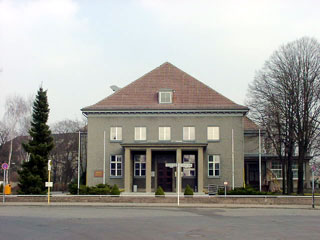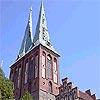German-Russian Museum Berlin-Karlshorst

![]() Permanent Exhibition
Permanent Exhibition
After the German-Soviet agreement about the withdraw from Germany by the Soviet armed forces both sides agreed in 1990 to use this place together to remember the historical event that ended the 2nd World War and the national-socialist regime. The war's painful impacts for both countries lead to the until now unique founding of a museum where former war opponents remember the war together. Sponsor of this museum is a club supported by both partners. The exhibition pieces of the former Capitulation Museum form the basis for the new exhibition; museums of both countries and private persons contributed numerous material. In addition to the presentation of historical originals the documentation gives with text and picture material essential information. Film and acoustic documents round off the exhibition.
![]() Address:
Address:
Zwieseler Str. 4 10318 Berlin-Karlshorst![]() +49 (30) 50 15 08 10
+49 (30) 50 15 08 10![]() Transport Links
Transport Links![]() S3 Bhf. Berlin-Karlshorst
S3 Bhf. Berlin-Karlshorst![]() 26, 27, 28
26, 27, 28 ![]() 396
396
To the Homepage of the Museum Karlshorst
![]() Museum History
Museum History
The 2nd World War in Europe ended on the 8th of May 1945 in Berlin-Karlshorst with the capitulation of the German Wehrmacht. In this the history's bloodiest conflict, at least 50 million people died. The National-Socialists' ambition to have world domination ended in an abysmal destruction last but not least in Germany itself. The fight between the German and Soviet troops was especially brutal as the national-socialist ideology intended the extermination and enslavement of the Slavic races.
The building was constructed between 1936 and 1938, as the officer's mess of the Wehrmacht's pioneer school 1. At the end of April 1945 the 5th Soviet shock Army headquartered here under Colonel General Bersarin in the battle of Berlin.
When on the 7th May the capitulation was performed with a first signing in Reims at the headquarter of General Eisenhower, the Supreme Commander of the Allied Forces, Field General Marshall Keitel, General Admiral von Friedeburg and Colonel-General Stumpf ratified here in Karlshorst in the night from the 8th to the 9th May with their signature the unconditional surrender. The signatures were accepted by Marshall Shukow as Soviet Supreme Commander and the British Air-Marshall and Eisenhower's deputy, Sir Arthur Tedder for the western headquarter; witnesses were the American General Spaatz and the French General de Lattre de Tassigny. This undersigning ended the war in Europe and was at the same time the interface between two epochs of European history in the 20th century.
From 1945 to 1949 the house was base to the chief of the Soviet military administration. On the10th October 1949 General Tschuikow awarded here the official authority to the first GDR government.
From 1967 to 1994 a museum remembered the Soviet forces ("Museum of the unconditional surrender by the fascist Germany in the Great Patriotic War 1941-1945") in this house during the attack of Berlin and the capitulation.
(Excerpt from the official Museum's Homepage)

 Deutsch
Deutsch Nederlands
Nederlands Dansk
Dansk Österreichisch
Österreichisch Po Polsku
Po Polsku

























